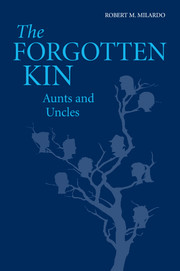Book contents
8 - The Social Reproduction of Aunts and Uncles
Published online by Cambridge University Press: 20 January 2010
Summary
The roles of aunts and uncles are likely flexible in their expression and in the accompanying expectations held by family members. As we have learned throughout the earlier chapters, aunts and uncles vary in their enactment of relationships with siblings and their children. As with many social positions, there is a certain amount of personal discretion involved; to a certain extent, individuals freely elect to develop and maintain personal relationships, or they elect not to do so. Further, like many social positions, there is a certain degree of flexibility in the expectations family members have of each other, expectations that define patterns of obligation and rules of engagement. And then, too, relationships and the social positions that comprise them are negotiated enterprises. Personal preferences must be negotiated with relational partners, and there are many. Developing and sustaining a relationship with a niece depends in part on the niece's preferences, her parents, grandparents, and quite possibly other family members. The expression of aunting and uncling and the expectations that pair with those expressions are continually being created and recreated in the ordinary discourse of family life. Earlier we referred to elements of this discourse as marriage or relationship work in which spouses talk with friends and relatives about their primary relationships, sometimes seeking advice and just as often seeking a sympathetic listener.
- Type
- Chapter
- Information
- The Forgotten KinAunts and Uncles, pp. 175 - 190Publisher: Cambridge University PressPrint publication year: 2009



